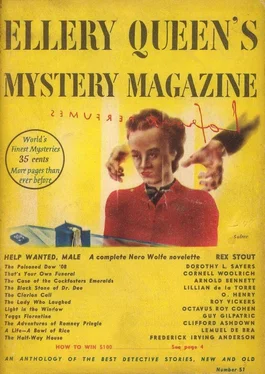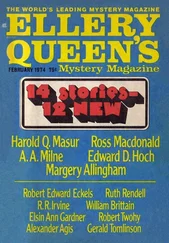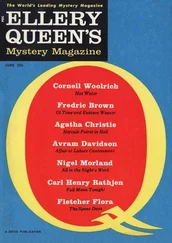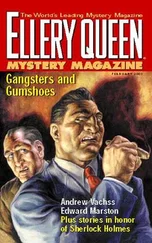Frederick Anderson - Ellery Queen's Mystery Magazine, Vol. 11, No. 51, February 1948
Здесь есть возможность читать онлайн «Frederick Anderson - Ellery Queen's Mystery Magazine, Vol. 11, No. 51, February 1948» весь текст электронной книги совершенно бесплатно (целиком полную версию без сокращений). В некоторых случаях можно слушать аудио, скачать через торрент в формате fb2 и присутствует краткое содержание. Город: New York, Год выпуска: 1948, Издательство: The American Mercury, Жанр: Классический детектив, на английском языке. Описание произведения, (предисловие) а так же отзывы посетителей доступны на портале библиотеки ЛибКат.
- Название:Ellery Queen's Mystery Magazine, Vol. 11, No. 51, February 1948
- Автор:
- Издательство:The American Mercury
- Жанр:
- Год:1948
- Город:New York
- ISBN:нет данных
- Рейтинг книги:3 / 5. Голосов: 1
-
Избранное:Добавить в избранное
- Отзывы:
-
Ваша оценка:
- 60
- 1
- 2
- 3
- 4
- 5
Ellery Queen's Mystery Magazine, Vol. 11, No. 51, February 1948: краткое содержание, описание и аннотация
Предлагаем к чтению аннотацию, описание, краткое содержание или предисловие (зависит от того, что написал сам автор книги «Ellery Queen's Mystery Magazine, Vol. 11, No. 51, February 1948»). Если вы не нашли необходимую информацию о книге — напишите в комментариях, мы постараемся отыскать её.
Ellery Queen's Mystery Magazine, Vol. 11, No. 51, February 1948 — читать онлайн бесплатно полную книгу (весь текст) целиком
Ниже представлен текст книги, разбитый по страницам. Система сохранения места последней прочитанной страницы, позволяет с удобством читать онлайн бесплатно книгу «Ellery Queen's Mystery Magazine, Vol. 11, No. 51, February 1948», без необходимости каждый раз заново искать на чём Вы остановились. Поставьте закладку, и сможете в любой момент перейти на страницу, на которой закончили чтение.
Интервал:
Закладка:
“My dear! My dear! This is carrying things with too high a hand!” broke in the man.
“You understand, don’t you?” She turned to Belden.
“Perfectly,” he replied, taking the coat from her. She went again to the rack, and this time brought back Oliver’s coat.
“I don’t know where your caps are. I packed your bags — just the things in your rooms. That was all, wasn’t it?”
“But — you can’t turn them out, like this!”
“It’s my house! I own it!” she replied.
She opened the door. “The moon has come out again. It’s freezing. I think you will find the walking good, sir. Thank you.” An icy blast swept in, tossing the ashes into fantastic eddies. Grinder stood waiting, eager. The two men stepped across the threshold.
“A boy from the village will be up early in the morning to clean out the furnace and build a fire,” said Belden.
As the door closed on them softly, Belden, turning up his collar, remarked to Oliver: “What an astonishingly coldblooded woman!”
It was four days later.
“Hello! I thought you were off for Antofogasta,” exclaimed Armiston, as the bridge builder entered his study. “No; I’m not busy,” said Oliver, quickly, as Belden looked inquiringly at Armiston’s visitor. The visitor shifted uneasily. It was Parr, deputy of police. Belden drew up a chair. “What’s the trouble?” asked Oliver.
“Money,” growled Belden. With a childlike smile he added, “Could you let me have a couple of millions?”
“As bad as that?”
“Worse. Did you notice the market this morning?”
“My dear fellow!” said Oliver in gentle reproof. “I invest. I don’t gamble. I only notice the market afternoons.”
“It sagged again,” said Belden glumly. “Hit a whale, or something. Nobody seems to know just what. Probably somebody’s got a toothache. I’m building a bridge, a railroad, a power plant. I need money. ‘They’ said, ‘Wait — market’s soft.’ I can’t wait. I told them so. They,’ ” muttered the engineer, referring to some remote hierarchy of money, “ ‘They’ said, ‘Go down and see Winchester.’ ” Armiston and Parr pricked up their ears. They exchanged a glance.
“Winchester is ‘Light-and-Power,’ ” explained Belden. “You may not know it, but every time you turn on a light, you do it by royal warrant from a man named Winchester.”
“Did you see him?” demanded Parr.
“I went there, like a fool,” said Belden. “Nobody home.”
“What did they tell you?”
“Oh, he’s having a conference in Kalamazoo — or Kamchatka. You know what satisfaction you can get out of a frozen-faced clerk The Chileans have got a time-limit on me. I’ve got to have money! I’ve got to find Winchester.”
“So have I,” remarked the deputy of police blandly.
“Eh?” ejaculated the bridge builder. Armiston chuckled.
“I don’t believe in using coincidence in my stories,” said Oliver. “But occasionally in real life it is necessary. Eh, Parr?” He fixed a quizzical look on the old man-hunter. “It seems that several gentlemen, whom we may designate generically as ‘They’ ” — he shot a look at Belden — “waited on Mr. Parr last night. They had a ‘hush’ job for him. They explained that a certain mogul of the Street, at a critical moment, had casually tossed everything he owned over his left shoulder, including a wife and family at Coronado, and stepped off the earth — with a left-handed lady.”
“Winchester?” exploded Belden. Oliver nodded.
“ ‘They’ want him back. That’s Parr’s job. Not to save his mortal soul. ‘They’ don’t give two whoops for that. But to save themselves.”
Belden cursed softly under his breath. That his enterprise, involving thousands of labor, and millions of dollars, must wait on the mad hour of one weak human being seemed too ironical for credence.
“Would you know him if you saw him?” asked Parr. Belden shook his head and Parr produced a photograph from his pocket.
“Good God!” roared Belden and Oliver, in unison, both jumping up.
“You do know him?” cried Parr.
“Know him!” bellowed the engineer, galvanized into action. “Know him? Didn’t he let his woman kick me out of my own house four nights ago?” He seized his hat and stick. “He’ll know me, before I get through with him.”
There was a dog howling. They had just crested the hill.
“Isn’t that Grinder?” This from Armiston, in sharp-drawn exclamation.
Belden and Armiston started forward at a sharp run. Parr caught up at the turn of the road.
“It is Grinder. Under that window,” said Oliver, and they hurried on.
On the kitchen porch, half covered with drifted snow, was a pile of things, supplies left by the boy from the store. The boy had stuck a note in the crack of the kitchen door. It read:
Dear Sir. The eggs and milk are in the potato bin. I built a fire. I saw a rat. I set the trap.
“Made their get-away, eh?” remarked the sardonic Parr.
Belden threw open the barn door. The car had not been moved. He looked up at the chimneys; they were cold.
He and Oliver put their shoulders to the stout old door. Parr added his weight to the task, and the door fell with a crash.
The room was as they had left it. Her mink coat and toque and a purple veil lay on an ottoman; the chess book, leaves open, rested on its stool before the fireplace. The fire was dead, its ashes stone cold. With a curious constriction of the throat Belden started for the stairs, his companions shuffling at his heels. The pink room they left to the last.
“Damn that woman!” Belden was muttering under his breath, obsessed now with horror. He thrust the door open. A faint musty odor met his nostrils. The wintry light struggling in through half-drawn curtains discovered to them what they sought: First their eyes picked up her little intimate luxuries of dress — a pair of tiny mules lying before a chair, a peignoir dropped carelessly across the foot of the bed; there, as if in serene sleep, lay the woman, one long white hand resting on the coverlet. As they stepped into the room they saw the body of Winchester, where he had dropped before the window.
“He was trying to open that window,” said Parr, in his businesslike tone.
It was dark when the old village doctor came, summoned by Parr, who had gone down to the station to wire discreetly to the hierarchical “They,” so they could make ready props for the crash. The old man, his long beard and furs tinseled with snow, came in shaking himself like a big dog.
His eyes rested on the woman’s garments on the ottoman. Thoughtfully he followed them up-stairs; at the door of the pink room he stopped, sniffing. “Humph!” He took the candle from Belden’s hand. “Here, eh? I thought old Jeduthalum had finished sharpening that ax!”
“ ‘Ax,’ ” said Oliver.
“Ah, there’s the other.” The doctor swung the candle, and the great shadows of the room revolved with it. He bent down over Winchester. “Cyanosed — do you see that?” Armiston nodded, curious. “Didn’t they know about this room?” asked the doctor.
“I told them. But — that woman! She had to find out for herself,” said Belden.
“Well, she knows now.” The old physician added after a pause, “I don’t believe in spirits — but I like fresh air.” He threw up the windows, then joined them outside, drawing the door tight behind him. As they desended. Parr was coming in.
“What was it, Doctor?” said Parr. The old man shook his head, thumbing his beard. “Something that has yet to be solved,” he said in his quiet voice. “They have been dead for days.”
Belden was thinking of the blind blows the dead can strike.
Читать дальшеИнтервал:
Закладка:
Похожие книги на «Ellery Queen's Mystery Magazine, Vol. 11, No. 51, February 1948»
Представляем Вашему вниманию похожие книги на «Ellery Queen's Mystery Magazine, Vol. 11, No. 51, February 1948» списком для выбора. Мы отобрали схожую по названию и смыслу литературу в надежде предоставить читателям больше вариантов отыскать новые, интересные, ещё непрочитанные произведения.
Обсуждение, отзывы о книге «Ellery Queen's Mystery Magazine, Vol. 11, No. 51, February 1948» и просто собственные мнения читателей. Оставьте ваши комментарии, напишите, что Вы думаете о произведении, его смысле или главных героях. Укажите что конкретно понравилось, а что нет, и почему Вы так считаете.












